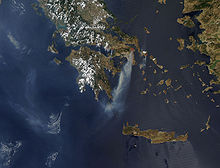- Climate of Greece
-
 Satellite image showing the locations of some of the 2009 Greek forest fires.
Satellite image showing the locations of some of the 2009 Greek forest fires.
The climate in Greece is predominantly Mediterranean. However, due to the country's unique geography, Greece has a remarkable range of micro-climates and local variations. To the west of the Pindus mountain range, the climate is generally wetter and has some maritime features. The east of the Pindus mountain range is generally drier and windier in summer. The highest peak is Mount Olympus at 9,570 feet (2,916.9 m) tall.
Contents
Categories
The climate of Greece can be divided into the following mediterranean climate subtypes:
Dry Mediterranean
This climate occurs in the Aegean Islands, especially the Cyclades and the Dodecanese, southern and parts of central Evia, low-lying areas of Attica, the eastern and south Peloponnesus, and the low-lying areas of Crete. During the summer, the weather is almost always sunny and dry, and any precipitation falls in the form of showers or thunderstorms from cumuliform clouds. The air is usually hot during the day and pleasantly warm at night. Heatwaves can occur, but they are usually quite mild at the coastal areas, where the Etesian winds blow throughout the summer. Winters are wet and any snow that falls does not last too long, especially in the south-facing slopes. Rain in winter is often persistent and can cause flooding.
Alpine Mediterranean
In this climate, the winter is harsh with abundant snowfalls, while the summers are cool with frequent thunderstorms. This climate is to be found on high mountains, like Pindus and Rhodope. Few meteorological stations are in areas with a truly Alpine Mediterranean climate in Greece and these are not available online.
Continental Mediterranean
This climate is wetter than the dry mediterranean and has cooler winters and not so hot summers. It occurs in most of Macedonia and Thrace.
Temperature
- Abs. minimum temperature: −27.8 °C (−18.0 °F), Ptolemaida.
- Abs. maximum temperature: 48.0 °C (118.4 °F), Elefsina and Tatoi.
Τhe +48.0 °C (118.40 °F) recorded by minimum/maximum thermomethers in Tatoi and Elefsina as reported by a communication of Dr. Athanasios D. Sarantopoulos is also the WMO record high temperature for Greece and Europe.[1] Average annual temperature in Greece ranges from +10 to +19.7 °C (50 to 67 °F). However, since Greece is generally a mountainous country, real average temperatures vary considerably from region to region.
Local winds
Etesians
Probably the most well known local winds in Greece are the etesians. With their name notating their annual fluctuation (έτος (étos) means year in Greek), these winds blow roughly from May to October, with their highest frequency being recorded in July and August. They keep temperatures and diurnal temperature fluctuations in the Aegean sea lower than the respective ones found in the Ionian sea or mainland Greece.
References
- ^ "Europe's highest temperature". http://wmo.asu.edu/europe-highest-temperature. Retrieved 3 April 2009.
External links
- Hellenic National Meteorological Service
- National Observatory of Athens
- Network of online weather stations
Climate of Europe Sovereign
states- Albania
- Andorra
- Armenia
- Austria
- Azerbaijan
- Belarus
- Belgium
- Bosnia and Herzegovina
- Bulgaria
- Croatia
- Cyprus
- Czech Republic
- Denmark
- Estonia
- Finland
- France
- Georgia
- Germany
- Greece
- Hungary
- Iceland
- Ireland
- Italy
- Kazakhstan
- Latvia
- Liechtenstein
- Lithuania
- Luxembourg
- Macedonia
- Malta
- Moldova
- Monaco
- Montenegro
- Netherlands
- Norway
- Poland
- Portugal
- Romania
- Russia
- San Marino
- Serbia
- Slovakia
- Slovenia
- Spain
- Sweden
- Switzerland
- Turkey
- Ukraine
- United Kingdom
- (England
- Northern Ireland
- Scotland
- Wales)
- Vatican City
States with limited
recognition- Abkhazia
- Kosovo
- Nagorno-Karabakh
- Northern Cyprus
- South Ossetia
- Transnistria
Dependencies
and other territoriesOther entities - European Union
- Sovereign Military Order of Malta
Categories:
Wikimedia Foundation. 2010.
